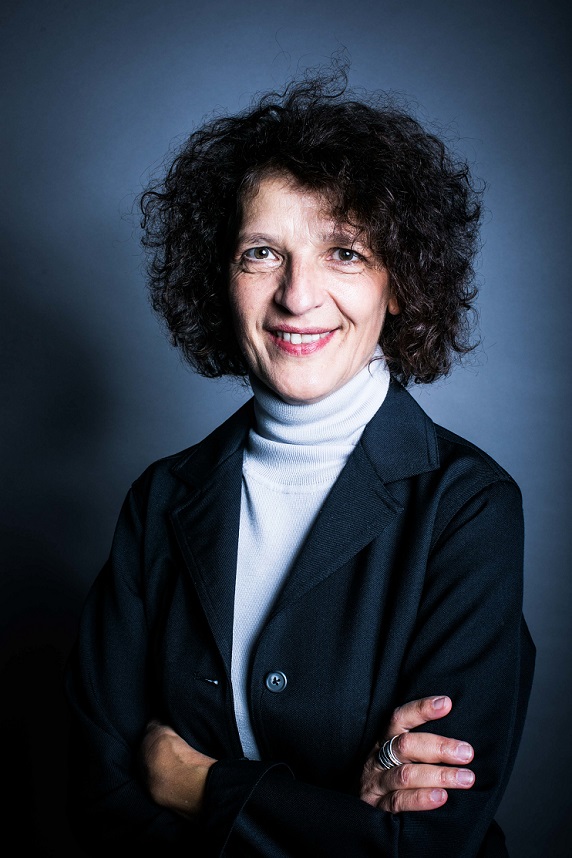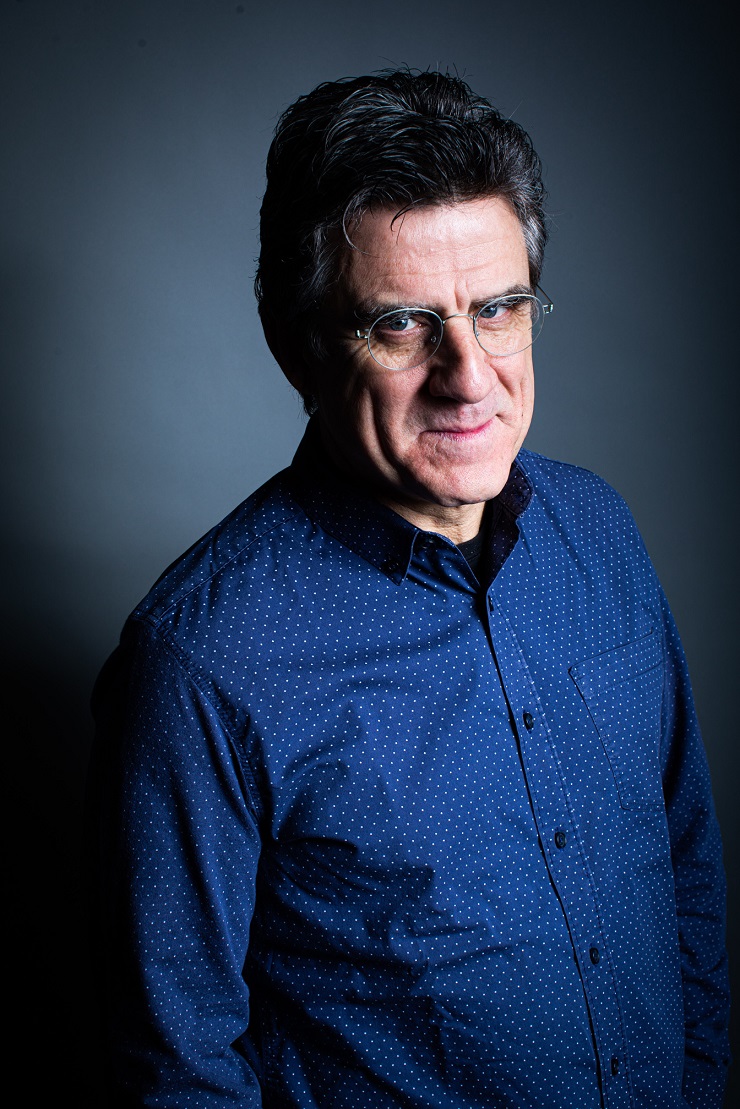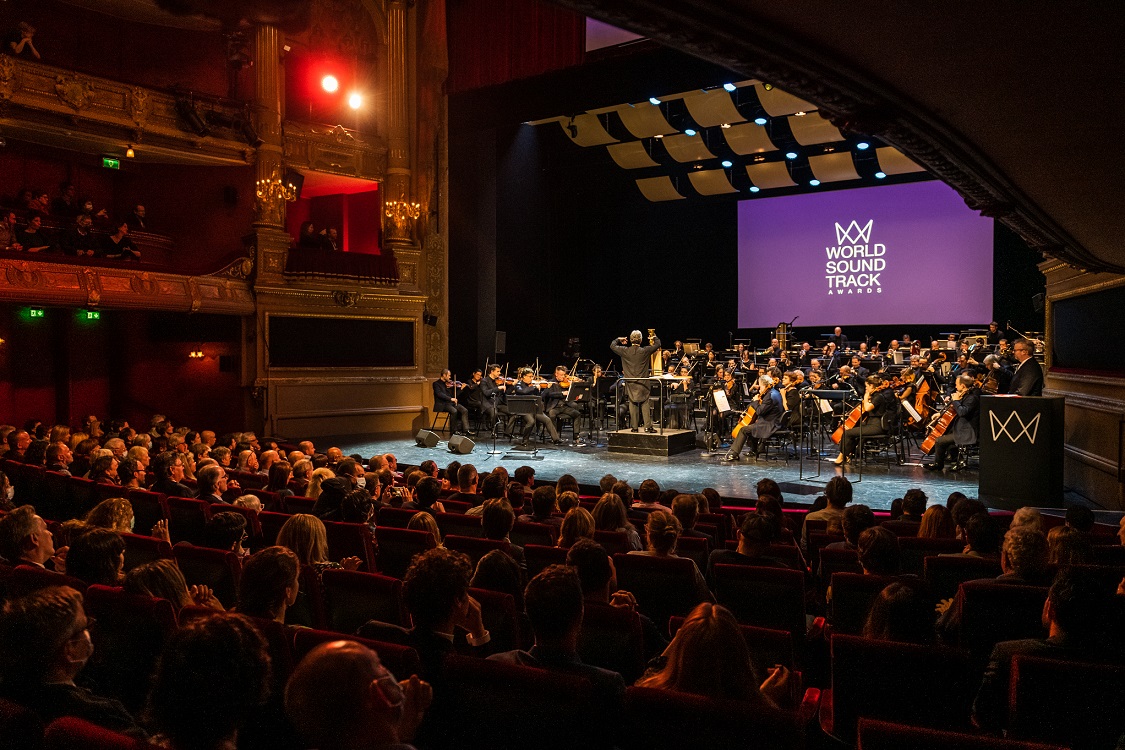For the first time in Film Fest Ghent’s near 50-year run, a composer is featured on the festival poster. While Jung Jae-il’s face might not be widely recognisable, even to fans of the small and big screen, many have surely heard his music. He wrote the soundtrack to the smart and chilling Oscar winner Parasite and the blockbuster Netflix series Squid Game.
Putting Jung’s picture on the poster and the cover of the programme is almost an overdue gesture for a festival that has been home to the World Soundtrack Awards (WSA) for more than 20 years. This is Belgium’s biggest film festival, the poster seen on giant banners whipping in the wind on the city’s main streets. It is almost always the face of an actor or a director, someone who the public will know.
Jung is nominated for Television Composer of the Year at the WSA, an annual event that recognises the best in soundtracks with more prizes, such as Best Original Song and Composer of the Year. Soundtrack composers see this honour as second only to the Oscars. Some of them find it equal or better because it’s dedicated to their genre.
The ceremony also includes a concert by the Brussels Philharmonic featuring some of the nominated soundtracks and winning scores from last year. Belgian composer Dirk Brossé, the long-time music director of the Film Fest Ghent, will conduct the concert, as well as another dedicated to Korean composers.
The WSA is a unique event, attracting the most prominent composers working today. They gather every year in Ghent for the awards and a rich industry programme, with master classes, seminars and discussions between composers and directors who frequently work together. This year, for instance, Americans David Lowery and Daniel Hart will talk about their many collaborations on films such as The Green Knight, The Old Man & the Gun and Pete’s Dragon.
The WSA was launched in 2001 “to ground the international position of the festival,” says Marijke Vandebuerie, Film Fest Ghent’s managing director. “There are so many festivals on the calendar that you need to have a unique position. That’s why we invest in film music.”
Even before then, the festival featured concerts of film music and gave its main prize to the movies with the most creative soundtracks. It was the first film festival in the world to invite composers to attend as special guests. “Festivals always invite directors and actors,” Vandebuerie says. “No one invited composers, even though the soundscape, the music – or the absence of music – is crucial to how a film feels.”
Soundtrack maestro Hans Zimmer – whose hundreds of scores include Gladiator, The Dark Knight Trilogy, Pirates of the Caribbean, Inception and The Lion King (both versions) as well as recent blockbusters like No Time to Die, Dune and Dunkirk – conducted his first concert at Film Fest Ghent. The massive show Hans Zimmer Live now tours the world selling out to crowds of people eager to see the composer conduct his music to a live orchestra.
Star-forming
Film Fest Ghent and the WSA “have played a key role in composers now being stars,” Vandebuerie says. “You now have promoters doing big tours of film music. You didn’t have that before.”
Besides Composer of the Year, the most coveted prize at the WSA is the Discovery of the Year. To be eligible, a composer cannot have worked on more than six feature films in a cinema release. “If you look at the Discovery list of winners, they all end up with a notable career,” says Brossé. “They soon after win an Oscar or a Grammy or a Bafta - something big.”

Film Fest Ghent’s managing director Marijke Vandebuerie, Credit: Bas Bogaerts
Indeed, 2001 Discovery winner Craig Armstrong went on to win a Bafta, a Grammy and a Golden Globe. The 2004 winner Gustavo Santaolalla would later win two Oscars, one for Brokeback Mountain and one for Babel. The same is true for 2005 winner Michael Giacchino, who five years later won the Oscar for Up. “If you are Discovery of the Year at the WSA, it’s a ticket to the Oscars,” Brossé says.
Film Fest Ghent also features a separate concert of Korean film music. Brossé will again conduct the Philharmonic, which will perform work by Jung as well as two other famous Korean composers: Lee Byung-woo (The Host, Mother) and Jo Yeong-wook (Oldboy, The Handmaiden). Jo, who often records his music in Belgium with Brossé will attend the concert in person.
The audience should not expect anything too exotic: South Korean film music is much like western film music, Brossé says. Yet while he knew this of Jo’s scores, Brossé was surprised that it was true of almost all soundtracks coming out of the country. “We discovered that interesting scores written by both well-known and lesser-known composers all pretty much sounded European or American,” he says. “Here and there is a touch of local flavour with an ethnic instrument, like a flute, but it’s 95% western-oriented.”
While somewhat disappointed, “it is what it is,” Brossé says. “I think it has to do with the directors, with what they are asking for, the type of music they want.”
A concert for all
The Ghent events give the public a rare glimpse into the soundtrack world: punters can buy tickets to the Korean concert or to the WSA, which take place in De Bijloke concert hall. While the venue is not sizeable, the location is spectacular: it is inside a medieval building once part of Ghent’s city hospital. There is no older building in the world that hosts a concert hall.
Special guests at this year’s WSA include Mark Isham (A River Runs Through It, Crash) and French composer Bruno Coulais, recipient of the Lifetime Achievement Award. One of the most prolific film and TV composers in the world, Coulais’s work includes the animated films Coraline and The Secret of Kells and the Cannes award-winning Masaan. Both composers will be present at the festival, along with Nainita Desai, who won the Discovery prize last year for her work on documentaries such as the harrowing For Sama and The Reason I Jump, the much-lauded film about how young people experience autism.

Music director of Film Fest Ghent, Dirk Brossé. Credit: Bas Bogaerts
The nominations have not yet been announced for this year’s Discovery prize, but those vying for Composer of the Year include Jonny Greenwood, known for The Power of the Dog and Spencer; Daniel Hart; and Hans Zimmer, who has not yet won the coveted prize.
Brossé cannot pinpoint a favourite this year, but he does know what he likes in a composer: those who also create compositions outside of the cinema industry. They know how to write music that lasts, he says. “Some composers think about the afterlife of the music. John Williams is a great example,” he says, singling out the doyen of movie music, who has given us instantly recognisable scores like Star Wars, Jaws and Raiders of the Lost Ark.
“Some film music serves the film only,” continues Brossé. “You take it away from the film, and there’s nothing there.” As a conductor, he certainly knows when that is the case. “Not all music is concert music. I know film composers now who can hardly read notes, who don’t know the difference between a cello and a saxophone because everything comes out of a machine. They make soundscapes and do things they think they have to do. And sometimes it serves the film, and that’s fine. But it doesn’t have a life beyond that.”

